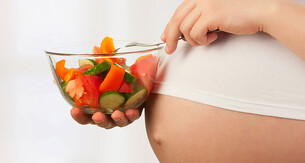Iodine is an essential mineral crucial for the proper functioning of the thyroid gland, which help to metabolism and growth. During pregnancy, iodine becomes even more important as it plays a crucial role in the development of the child’s brain and nervous system. Pregnant women need more iodine to support their own thyroid function as well as to ensure the healthy development of their developing baby.
Iodine for the thyroid gland

What is Iodine?
Iodine is an important ingredient for the proper functioning of the human body. It is an essential component of thyroid hormones. These hormones play an important role in regulating the metabolism of the body. Overall, iodine is an essential nutrient that plays an important role in maintaining health and well-being, especially in the regulation of thyroid function and the development of the nervous system.
Why is Iodine important in pregnancy?
Iodine for pregnant women is essential as it helps with the proper development of the developing baby’s nervous system and brain. Iodine in thyroid hormones play a critical role in fetal brain development, especially during the first trimester.
Iodine plays huge role in biological processes, as thyroid gland absorbs iodine from the bloodstream to produce thyroid hormones, primarily thyroxine (T4) and triiodothyronine (T3). These hormones are essential for regulating metabolism, growth, and development throughout the body.
Iodine is important for overall health as it is necessary for proper functioning of various tissues and organs, as well as brains, muscles and skin. Enough iodine intake is especially important during pregnancy and infancy for the healthy development of the fetal brain and nervous system.
How much Iodine do pregnant women need?
The recommended iodine intake during pregnancy can vary, and it is important for pregnant women to consult with the healthcare professionals to identify their individuals needs. There are data indicated that the iodine intake required to prevent the onset of subclinical hypothyroidism of mother and foetus during pregnancy, and thus to prevent the possible risk of brain damage of the foetus, is approximately 3.5 µg/kg/day or 200 µg/day (FAO/WHO, 2002). However, kindly consult your doctor before taking any supplements to understand your body needs.
The amount of iodine for women outside of pregnancy is a daily iodine intake of 150 micrograms (mcg) for adults, including pregnant and lactating women, as recommended by World Health Organization (WHO).
Iodine deficiency and iodine overconsumption
Iodine deficiency occurs when there is insufficient iodine intake to meet the body's needs for thyroid hormone production and other essential functions. It is one of the most common preventable causes of intellectual and developmental disabilities worldwide.
Iodine deficiency can manifest in various ways and can affect people of all ages, from infants to adults. Here's how iodine deficiency can manifest, such as intellectual and development issues, and so on.
Iodine Deficiency
1. Intellectual and Development Issues: Lack of iodine may lead to hypothyroidism in the baby, which results in the development delays and intellectual disabilities.
2. Risk in Pregnancy Complications: Deficiency of iodine during pregnancy causes an increased risk during pregnancy and other adverse outcomes.
Iodine Overconsumption
1. Thyroid Dysfunction: High levels of iodine can inhibit the production of thyroid hormones, leading to hypothyroidism or hyperthyroidism
2. Autoimmune Thyroiditis: Excessive iodine in the body may trigger an inflammation of the thyroid gland.
Best food sources for Iodine
1. Fruits and Vegetables
- Leafy green vegetables: spinach and kale (around 1-10 micrograms of iodine per 100 grams.)
- Other vegetables like potatoes, carrots, and broccoli may contain similar trace amounts of iodine.
- Fruits: strawberries, bananas, and oranges (less than 1 microgram per serving.)
2. Dairy Products
- Milk: On average, cow's milk contains about 13 to 116 micrograms of iodine per liter (mcg/L), with levels typically ranging from 50 to 70 mcg/L.
- Cheese: Iodine content in cheese can range from 10 to 80 micrograms per 100 grams (mcg/100g), with some varieties containing even higher levels.
- Yoghurt: Yoghurt may contain around 20 to 50 micrograms of iodine per 100 grams (mcg/100g).
3. Seafood
- Cod: Typically contains around 100 to 200 micrograms of iodine per 100 grams (mcg/100g).
- Shrimp: Typically contains around 35 to 45 micrograms of iodine per 100 grams (mcg/100g).
Salmon: Typically contains around 20 to 30 micrograms of iodine per 100 grams (mcg/100g).
- Tuna: Typically ranging from 10 to 30 micrograms per 100 grams (mcg/100g). Tuna can be added into salad for a balanced diet.
- Seaweed: Often containing thousands of micrograms of iodine per 100 grams (mcg/100g).
Are Iodine supplements necessary?
In general, people can obtain sufficient iodine from regular food intake. However, if there are situations where an iodine supplement may be necessary, like iodine deficiency, pregnancy, special diets, the consideration to intake supplements can be prioritized.
1. Potassium Iodide: Potassium iodide is a stable form of iodine that is often used in dietary supplements and medications to prevent iodine deficiency.
2. Kelp Supplements: Kelp is a type of seaweed that naturally contains high levels of iodine. Supplements made from kelp extract or dried kelp powder can provide a concentrated source of iodine.
Multivitamins with Iodine: Some multivitamin supplements include iodine as one of the essential nutrients. These supplements are convenient for individuals who prefer to take a single daily supplement to meet their nutritional needs.
Frequently asked questions on Iodine in pregnancy:
Why is iodine important for pregnancy?
Iodine for pregnant women is essential as it helps with the proper development of the developing baby’s nervous system and brain. Iodine in thyroid hormones play a critical role in fetal brain development, especially during the first trimester.
Is iodine safe for pregnant women?
Iodine should be taken in moderation and with the amount that is recommended by individual healthcare professionals. It is crucial for the development of the fetal brain and nervous system, making it essential for pregnant women.
How much iodine should you take in pregnancy?
The National Health and Medical Research Council (NHMRC) recommended that pregnant women should have 220 micrograms of iodine. However, kindly consult your doctor before taking any supplements to understand your body needs.




